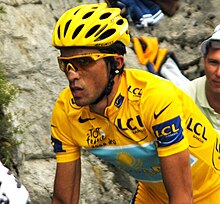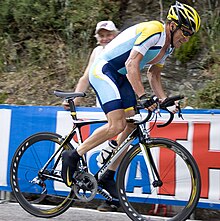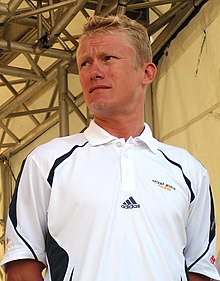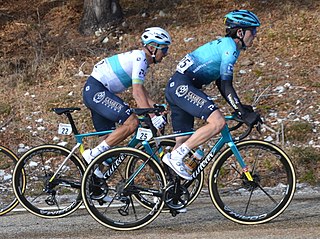
Astana Qazaqstan Team is a professional road bicycle racing team sponsored by the Samruk-Kazyna, a coalition of state-owned companies from Kazakhstan and named after its capital city Astana. Astana attained UCI ProTeam status in its inaugural year, 2007. Following a major doping scandal involving Kazakh rider Alexander Vinokourov, team management was terminated and new management brought in for the 2008 season. The team was then managed by Johan Bruyneel, former team manager of U.S. Postal/Discovery Channel team. Under Bruyneel the ethical nature of the team did not improve, although Astana in this period was very successful.

Alexander Nikolayevich Vinokourov is a Kazakhstani former professional road bicycle racer and the current general manager of UCI WorldTeam Astana Qazaqstan Team. He is of Russian origin. As a competitor, his achievements include two bronze medals at the World Championships, four stage wins in the Tour de France, four in the Vuelta a España plus the overall title in 2006, two Liège–Bastogne–Liège monuments, one Amstel Gold Race, and the gold medal at the 2012 London Olympics Men's Road Race. Vinokourov is a past national champion of Kazakhstan, and a dual-medalist at the Summer Olympics. In 2007, he received a two-year ban from cycling for blood doping. In 2019, he was accused of race fixing by prosecutors in Liège but was later cleared of the charges.

Levi Leipheimer is an American former professional road racing cyclist. He was twice US national champion, winning the time trial title in 1999 and the road race in 2007, and is an Olympic medalist. Leipheimer was born and raised in Butte, Montana and resides in Santa Rosa, California. He is the patron of the widely attended King Ridge GranFondo, a mass participation ride in Sonoma County.
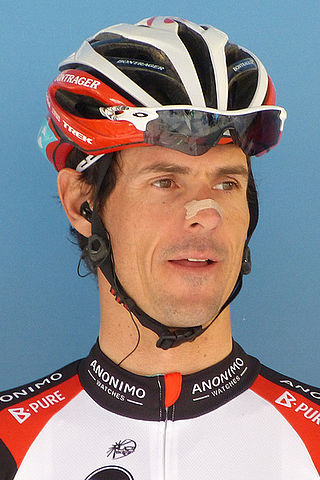
Andreas Klöden is a German former professional road bicycle racer, who competed as a professional between 1998 and 2013. His major achievements include a bronze medal at the 2000 Olympic Games and finishing second in the general classification at the 2004 and 2006 Tour de France. Klöden was a tall, lightly built racer with enough strength to place high in the overall classifications of the Grand Tours, but his performances were affected by injuries.

Johan Bruyneel is a Belgian former professional road bicycle racer and a former directeur sportif for UCI ProTour team RadioShack–Nissan, and U.S. Postal Service, a US-based UCI ProTour cycling team. On 25 October 2018, the World Anti Doping Agency imposed a lifetime ban on Bruyneel for his role in a doping scandal that also saw Lance Armstrong stripped of his seven Tour de France titles.

Yaroslav Popovych is a Ukrainian former professional cyclist, who rode professionally between 2002 and 2016.
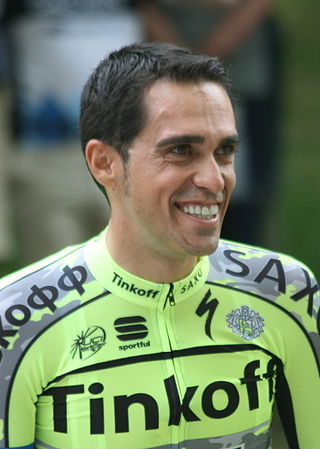
Alberto Contador Velasco is a Spanish former professional cyclist. He is one of the most successful riders of his era, winning the Tour de France twice, the Giro d'Italia twice, and the Vuelta a España three times. He is one of only six riders to have won all three Grand Tours of cycling, and one of only two riders to have won all three more than once. He has also won the Vélo d'Or a record 4 times.
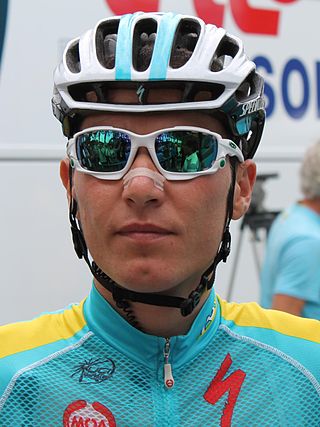
Janez "Jani" Brajkovič is a racing cyclist from Metlika, Slovenia, who most recently rode for UCI Continental team Adria Mobil. He was the world under-23 Time Trial champion in 2004.

Haimar Zubeldia Agirre is a Spanish former road racing cyclist from the Basque Country, who competed professionally between 1998 and 2017 for the Euskaltel–Euskadi, Astana, Team RadioShack and Trek–Segafredo teams. During his career, Zubeldia recorded five top-ten finishes in the Tour de France, and one in the Vuelta a España.
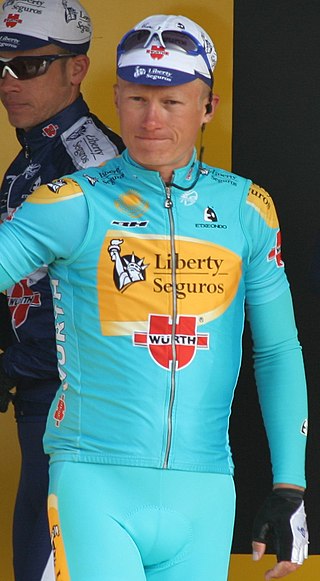
The 2007 Tour de France was affected by a series of scandals and speculations related to doping. By the end of the Tour, two cyclists were dismissed for failing tests and the wearer of the yellow jersey was voluntarily retired by his team for lying about his whereabouts and missing doping tests. A fourth rider was confirmed to having used doping while in a training session prior to the 2007 Tour and a fifth rider failed tests late in the race, with his result being officially announced just after the end of the Tour. During the competition, two teams were asked to withdraw after at least one member was found to have doped.

The 2010 Giro d'Italia was the 93rd edition of the Giro d'Italia, one of cycling's Grand Tours. The race started off in Amsterdam on 8 May and stayed in the Netherlands for three stages, before leaving the country. The route included climbs such as Monte Zoncolan, Plan de Corones, the Passo del Mortirolo and the Passo di Gavia before ending in Verona with an individual time trial.
The 2008 season for the Astana cycling team began in January with the Tour Down Under and ended in October with the Giro di Lombardia. As a UCI ProTour team, they were automatically invited and obliged to attend every event in the UCI ProTour.

The 2007 season for the Astana cycling team was its first, though the team's sponsors in the Kazakhstani government had entered the sport the year before backing the dissolved Liberty Seguros team. That same team was known as "Astana" for part of the season, including the 2006 Vuelta a España, but as the UCI license previously held by Manolo Saiz transferred to new ownership, headquartered in a new nation, it is considered a new team from 2007 onward. The team's manager for the 2007 season was former Tour de Suisse organizer Marc Biver, who had never before managed a cycling team at any level.

Team RadioShack was a professional road bicycle racing team, with RadioShack as the title sponsor, the creation of which was announced on July 23, 2009. Lance Armstrong co-owned and led the team, which raced in the Grand Tours and the UCI ProTour. The team was managed by Capital Sports and Entertainment, an Austin, Texas sports and event management group that also manages the Trek-Livestrong U23 development cycling team and that ran the former Discovery Channel Pro Cycling Team.
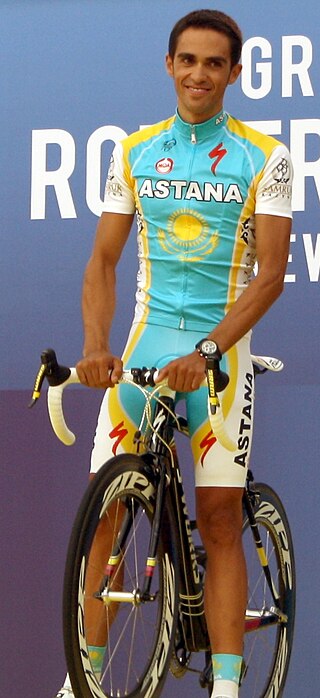
The 2010 season for the Astana cycling team began in January with the Tour Down Under and ended in October at the Giro di Lombardia. As a UCI ProTour team, they were automatically invited and obligated to send a squad to every ProTour event.
The 2010 season for Team RadioShack, its first, began in January with the Tour Down Under and ended in October at the Giro di Lombardia. Team RadioShack rode in 2010 a UCI ProTour team, and was thus automatically invited to and obligated to send a squad to every ProTour event.

The 2011 season for the Astana cycling team began in January at the Tour Down Under and ended in October at the Tour of Hainan. As a UCI ProTeam, they were automatically invited and obligated to send a squad to every event in the UCI World Tour. In a change from the 2010 season, the team's manager was Giuseppe Martinelli, replacing Yvon Sanquer. There was also a major change in ridership, as three-time Tour de France champion Alberto Contador departed for Saxo Bank–SunGard, while his doping case remains unresolved. Three Spanish domestiques followed Contador to Saxo Bank–SunGard, while two climbing talents who spent the previous season with Liquigas–Doimo, Roman Kreuziger and Robert Kišerlovski, were notable additions to the team for 2011.
The 2011 season for Team RadioShack began in January at the Tour Down Under and ended in October with Robbie McEwen's participation in the Noosa Grand Prix. As a UCI ProTeam, they were automatically invited and obligated to send a squad to every event in the UCI World Tour.



